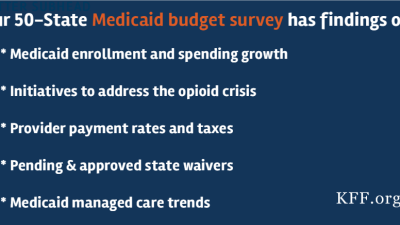 Medicaid Moving Ahead in Uncertain Times: Results from a 50-State Medicaid Budget Survey for State Fiscal Years 2017 and 2018
Report
Medicaid Moving Ahead in Uncertain Times: Results from a 50-State Medicaid Budget Survey for State Fiscal Years 2017 and 2018
Report
This report provides an in-depth examination of the changes taking place in Medicaid programs across the country. Report findings are drawn from the annual budget survey of Medicaid officials in all 50 states and the District of Columbia conducted by the Kaiser Family Foundation (KFF) and Health Management Associates (HMA), in collaboration with the National Association of Medicaid Directors (NAMD). This report examines the reforms, policy changes, and initiatives that occurred in FY 2017 and those adopted for implementation for FY 2018 (which began for most states on July 1, 2017). Key areas covered include changes in eligibility and enrollment, managed care and delivery system reforms, long-term services and supports, provider payment rates and taxes, covered benefits (including prescription drug policies), and opioid harm reduction strategies.